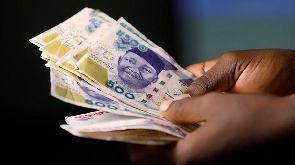The Nigerian naira plunged to its lowest point on record in official trading as a shortage of US dollars persisted despite promises by the government to boost supply.
The local unit weakened by 23% to 1,099 naira per dollar on Friday, according to Lagos-based FMDQ, which tracks exchange rate for the West African nation. The naira has been volatile in response to the level of dollar liquidity since the Nigerian government eased currency controls in June, a move that sparked a rapid 40% slide.
Nigerian Central Bank Governor Olayemi Cardoso in November pledged to clear forward foreign-exchange contracts that have discouraged investor inflows and weighed on the local unit, as well as curb inflation to improve the economic outlook.
However, the promise to clear the backlog only succeeded in stabilizing the parallel market rate, as residents that had been hoarding dollars brought them out for sale to avoid losses, easing supplies in the unauthorized currency market.
Read more: Naira Street Price Steadies As Central Bank Makes Itself Felt
Liquidity has oscillated on the official market, where the central bank and lenders are the main suppliers, according to the investment bank Chapel Hill Denham.
The local unit has swung between 750 and 1,099 naira per dollar on the official market since mid-November, driven by foreign currency scarcity. That compares to rates of between 1,135 and 1,168 naira per dollar it has traded in the unauthorized forex market, which has seen an improvement in dollar supply.
Nigerians who can’t access dollars on the official market are forced to exchange currency at a premium by using street dealers.
Separately, Nigeria’s credit outlook was raised to positive by Moody’s Investors Service late Friday as the nation takes steps to improve its fiscal position and shore up foreign reserves.
Moody’s cited actions taken by the government, including devaluation of the naira, for its move.
Business News of Sunday, 10 December 2023
Source: bloomberg.com













